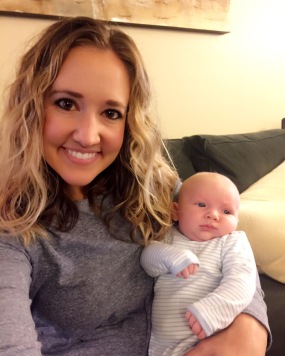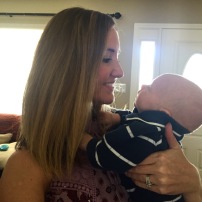As a new mom with Crohn’s, there are countless stories of postpartum flares that typically rear their ugly head around 2-3 months postpartum. You hear it from your doctors and from those on social media. Today marks two months since we welcomed our son Reid to the world. Navigating these first weeks as a new parent with a chronic illness has been interesting to say the least. 
Like all flare ups—they tend to happen when you least expect it, coming out of nowhere to remind you that the disease is still very much a part of who you are. This time of the disease process is unique in that you are almost anticipating and wondering when symptoms are going to strike.
Out of the last eight weeks, I’d say I’ve had about 10-15 “bad” days. Meaning I felt that unwelcome gnawing pain or needed to take pain medication. While it hasn’t been ideal at times, I know it could be a lot worse. My symptoms are certainly not enough to need a hospitalization at this point. I’m hoping I can make it through these “postpartum” months and dodge that bullet.
Reid has offered up amazing inspiration to me when I give myself my Humira injections. For more than eight years, I’ve stared at something on the wall or a photo of a person who inspires me to “get in the zone” when the needle is in my leg. Now, I have my husband stand in front of me holding Reid and I stare into the eyes of my sweet little man. Looking at him eases my pain and is a reminder that I have to stay healthy and be strong so I don’t have to take a break in a hospital bed without him by my side.
The past week there have been countless occasions where I’ve been in the middle of feeding him and felt the urgent nee d to run to the bathroom. It’s been hard and it’s stressful. When I’m home alone and there’s no one around to swoop him up, I do all I can to muster up the strength to hold it. It’s not easy. Sometimes I don’t even know if I’m going to make it in time to the bathroom. Sure, I could interrupt his feeding and put him down…but, that’s easier said than done. My priority is to keep him happy and content.
d to run to the bathroom. It’s been hard and it’s stressful. When I’m home alone and there’s no one around to swoop him up, I do all I can to muster up the strength to hold it. It’s not easy. Sometimes I don’t even know if I’m going to make it in time to the bathroom. Sure, I could interrupt his feeding and put him down…but, that’s easier said than done. My priority is to keep him happy and content.
Part of living with Crohn’s is dealing with extreme fatigue. Not the kind of tired where you didn’t get enough zzzs the night before. I’m talking about an exhaustion that consumes your whole body. It’s very similar to how it feels that first trimester of pregnancy, when there are days your legs feel like jello and you don’t know how you’re going to make it through a work day upright. The lack of sleep associated with having a newborn and battling Crohn’s can be downright difficult. I’ve combatted that with coffee… which is probably part of the reason why I’m having some “urgency” issues.
 Like all change—it takes time, learning and patience. Being a mom and enduring pregnancy and childbirth makes you feel like somewhat of a superwoman. You look at this perfect little human that you created within yourself. So, while there may be some “bad” days along the way, they are completely overshadowed by the incredible ones. The magical moments when your baby smiles at you, stares up at you in the middle of the night while he eats or calms once he’s placed in your arms. While the Crohn’s symptoms are a reminder that I’m not a “typical” mom, they also remind me that despite my medical ailments, I was still able to bring a life into this world…and nothing will ever change that.
Like all change—it takes time, learning and patience. Being a mom and enduring pregnancy and childbirth makes you feel like somewhat of a superwoman. You look at this perfect little human that you created within yourself. So, while there may be some “bad” days along the way, they are completely overshadowed by the incredible ones. The magical moments when your baby smiles at you, stares up at you in the middle of the night while he eats or calms once he’s placed in your arms. While the Crohn’s symptoms are a reminder that I’m not a “typical” mom, they also remind me that despite my medical ailments, I was still able to bring a life into this world…and nothing will ever change that.






 resulted in us having to leave in the middle of the game due to my stabbing stomach pains. In this photo we had left the stadium and the only “cab” we could find was a guy on a bike with a carriage to take us to our car. I was in so much pain I couldn’t even walk to the car. Our smiles tell a whole different story.
resulted in us having to leave in the middle of the game due to my stabbing stomach pains. In this photo we had left the stadium and the only “cab” we could find was a guy on a bike with a carriage to take us to our car. I was in so much pain I couldn’t even walk to the car. Our smiles tell a whole different story. I cried in the stall as my mind frantically thought—how the hell am I am going to be able to eat at my wedding and get out of dress in time to use the bathroom? Lucky for me, I didn’t end up needing one bathroom break the day of my wedding.
I cried in the stall as my mind frantically thought—how the hell am I am going to be able to eat at my wedding and get out of dress in time to use the bathroom? Lucky for me, I didn’t end up needing one bathroom break the day of my wedding. Rather than go home and miss out on quality time with my girls, I popped a Tylenol with codeine and powered through.
Rather than go home and miss out on quality time with my girls, I popped a Tylenol with codeine and powered through.

 As I paced around the house doing a silly waltz and singing ridiculous lyrics to him on the fly, I had to pause and laugh at my appearance in the mirror. For a moment I felt unrecognizable to myself. While being a new mom is miraculous and the best gift—it’s a major adjustment, something all parents can attest to.
As I paced around the house doing a silly waltz and singing ridiculous lyrics to him on the fly, I had to pause and laugh at my appearance in the mirror. For a moment I felt unrecognizable to myself. While being a new mom is miraculous and the best gift—it’s a major adjustment, something all parents can attest to.




 bout how she gives herself shots in her legs, and I immediately thought about this picture. Look at those hot legs! She looks great. I’ll be fine.
bout how she gives herself shots in her legs, and I immediately thought about this picture. Look at those hot legs! She looks great. I’ll be fine.